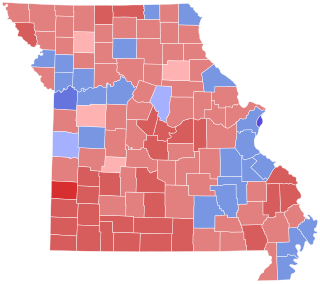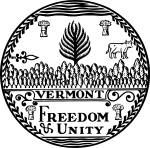
The 2002 United States Senate elections featured a series of fiercely contested elections that resulted in a victory for the Republican Party, which gained two seats and thus a narrow majority from the Democratic Party in the United States Senate. The Senate seats up for election, known as class 2 Senate seats, were last up for regular election in 1996. The election cycle was held on November 5, 2002, almost 14 months after the September 11, 2001, attacks.

The 2000 United States Senate elections were held on November 7, 2000. The elections coincided with other federal and state elections, including the presidential election which was won by Republican George W. Bush. These elections took place 6 years after Republicans had won a net gain of 8 seats in Senate Class 1. Despite George W. Bush's victory in the presidential election, the Republicans lost 4 senate seats, the most a winning president's party has lost since the passage of the 17th Amendment. This election marked the first election year since 1990 where Democrats made net gains in the Senate. Democrats defeated incumbent Republicans in Delaware, Michigan, Minnesota, Missouri, and Washington, and they won an open seat in Florida. In Missouri, the winner was elected posthumously. The Republicans defeated a Democratic incumbent in Virginia, and won an open seat in Nevada. Additionally, a Republican in Georgia died earlier in the year and a Democrat was appointed to replace him, who then went on to win the special election.

The 1994 United States Senate elections were held November 8, 1994, with the 33 seats of Class 1 contested in regular elections. Special elections were also held to fill vacancies. The Republican Party took control of the Senate from the Democrats. Like for most other midterm elections, the opposition, this time being the Republicans, held the traditional advantage. The congressional Republicans campaigned against the early presidency of Bill Clinton, including his unsuccessful healthcare plan. Democrats held a 56–44 majority, after having lost a seat in Texas in a 1993 special election.

The 1986 United States Senate elections were elections for the United States Senate. Held on November 4, in the middle of Ronald Reagan's second presidential term, the 34 seats of Class 3 were contested in regular elections. The Republicans had to defend an unusually large number of freshman Senate incumbents who had been elected on President Ronald Reagan's coattails in 1980. Democrats won a net of eight seats, defeating seven freshman incumbents, picking up two Republican-held open seats, and regaining control of the Senate for the first time since January 1981. This remains the most recent midterm election cycle in which the sitting president's party suffered net losses while still flipping a Senate seat.

Jan Backus is a retired American politician who served as a Vermont state senator representing Windham County from 1989 to 1994 and Chittenden County from 1997 to 2000. A community activist, Backus served as a member of the Vermont Southeast Supervisory Union board for many years before making a run for the Vermont state Senate and winning a seat. She served as chairwoman of the Senate Health & Welfare Committee and a member of the Senate Judiciary Committee.

The 2006 United States Senate election in Vermont was held November 7, 2006. Incumbent independent Senator Jim Jeffords decided to retire rather than seek reelection to a fourth term, and Bernie Sanders was elected to succeed him.

The 2002 United States Senate special election in Missouri was held on November 5, 2002, to decide who would serve the rest of Democrat Mel Carnahan's term, after he died while campaigning and posthumously won the 2000 election. The winner would serve the remainder of the term ending in 2007. Governor Roger Wilson appointed Carnahan's wife Jean, also a Democrat, to serve temporarily. She then decided to run to serve the remainder of the term, but she was narrowly defeated by Republican nominee Jim Talent.

The 2002 United States elections were held on November 5, in the middle of Republican President George W. Bush's first term. Republicans won unified control of Congress, picking up seats in both chambers of Congress, making Bush the first president since Franklin D. Roosevelt in 1934 to gain seats in both houses of Congress. In the gubernatorial elections, Democrats won a net gain of one seat. The elections were held just a little under fourteen months after the September 11 attacks. Thus, the elections were heavily overshadowed by the War on Terror.

The 2004 United States Senate election in Alaska took place on November 2, 2004, alongside other elections to the United States Senate in other states as well as elections to the United States House of Representatives, various state and local elections, and the presidential election of that year. Incumbent Republican U.S. Senator Lisa Murkowski of Anchorage, sought election to her first full term after being appointed by her father Frank Murkowski to serve out the rest of the latter's unexpired term when he resigned in December 2002 to become Governor of Alaska. Her main challenger was Democratic former governor Tony Knowles, her father's predecessor as governor. Murkowski won by a slight margin. As of 2022, Lisa Murkowski’s vote total of 149,773 votes remains the most raw votes she has ever received during any of her runs for the US Senate.

The 2000 United States Senate election in Vermont took place on November 7, 2000. Incumbent Republican U.S. Senator Jim Jeffords won re-election to a third term in office. In May 2001, Jeffords left the Republican Party and announced that he would become an independent who would caucus with the Democratic Party. His party exit broke the 50–50 lock in the Senate and effectively gave the Democrats the majority. Thus, that switch marked the first time since 1855 that Vermont had no Republicans in its entire congressional delegation.

The 1986 United States Senate election in North Carolina was held on November 4, 1986 as part of the nationwide elections to the Senate. Incumbent Republican U.S. Senator Jim Broyhill, who had been appointed in June 1986 to serve out the rest of John Porter East's term, faced off against the popular Democratic former Governor Terry Sanford.

The 1992 United States Senate election in Alaska was held on November 3, 1992. Incumbent Republican United States Senator Frank Murkowski sought re-election to a third term in the United States Senate. Tony Smith, the Democratic nominee and a former Commissioner of Economic Development, won his party's nomination in a crowded primary and faced off against Murkowski in the general election. Though Murkowski was held to a lower vote percentage than he received six years prior, he was ultimately re-elected.

The 1992 United States Senate election in Vermont was held on November 3, 1992. Incumbent Democratic U.S. Senator Patrick Leahy won re-election to a fourth term.

The 1986 United States Senate election in Vermont was held on November 4, 1986. Incumbent Democratic U.S. Senator Patrick Leahy won reelection to a third term, defeating Republican former governor Richard Snelling by a landslide margin of almost 30 points, in a race that was initially expected to be quite competitive, as Snelling was recruited to run by popular President Ronald Reagan.

The 1994 United States Senate election in Washington was held November 8, 1994. Incumbent Senator Slade Gorton won re-election to a second consecutive term. As of 2024, this was the last time a Republican or a man won a U.S. Senate election in Washington.

The 2014 United States House of Representatives elections in Oklahoma were held on Tuesday, November 4, 2014, to elect the five U.S. representatives from the state of Oklahoma, one from each of the state's five congressional districts. The elections coincided with other elections to the United States Senate and House of Representatives and various state and local elections, including the Governor of Oklahoma and both of Oklahoma's United States Senate seats. Primary elections were held on June 24, 2014. Primary runoffs were held on August 26, 2014, in contests where no candidate won more than 50% of the vote.

The 1988 United States Senate election in Vermont took place on November 8, 1988. Incumbent Republican Robert Stafford did not run for re-election to another term in the United States Senate. Republican candidate Jim Jeffords defeated Democratic candidate Bill Gray to succeed him.

A general election was held in the U.S. state of Vermont on November 5, 2002. All of Vermont's executive officers were up for election as well as Vermont's at-large seat in the United States House of Representatives.

A general election was held in the U.S. state of Vermont on November 2, 2004. All of Vermont's executive officers were up for election as well as Vermont's at-large seat in the U.S. House and Class 3 U.S. Senate seat. The 2004 presidential election was also held at the same time.

A general election was held in the U.S. state of Vermont on November 3, 2020. All of Vermont's executive officers were up for election, as well as Vermont's at-large seat in the United States House of Representatives. Primary elections were held on August 11, 2020.






















